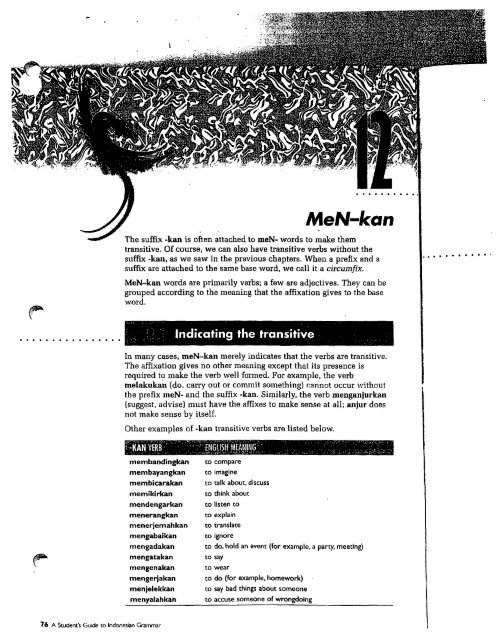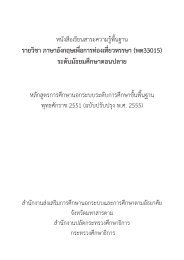bahasa indonesia
djenar-2003-a-students-guide-to-indonesian-grammar-oxford
djenar-2003-a-students-guide-to-indonesian-grammar-oxford
- No tags were found...
Create successful ePaper yourself
Turn your PDF publications into a flip-book with our unique Google optimized e-Paper software.
4 The suffix -kan is often attached to meN- words to make them I<br />
transitive. Of course, we can also have transitive verbs without the<br />
suffix -kan, as we saw in the previous chapters. When a prefix and a<br />
suffix are attached to the same base word, we call it a circumfix.<br />
MeN-kan words are primarily verbs; a few are adjectives. They can be<br />
grouped according to the meaning that the affixation gives to the base<br />
word.<br />
In many cases, meN-kan merely indicates that the verbs are transitive.<br />
The affixation gives no other meaning except that its presence is<br />
required to make the verb well formed. For example, the verb<br />
melakuka-n (do, carry out or commit something) cannot occur without<br />
the prefix meN- and the suffix -kan. Similarly, the verb menganjurkan<br />
[suggest, advise) must have the affixes to make sense at all; anjur does<br />
not make sense by itself.<br />
Other examples of -kan transitive verbs are listed below.<br />
membandingkan to compare<br />
mem bayangkan to imagine<br />
mem bicarakan to talk about, discuss<br />
memikirkan to think about<br />
mendengarkan to listen to<br />
menerangkan to explain<br />
menerjemahkan to translate<br />
mengabaikan to ignore<br />
mengadakan to do, hold an event (for example, a parry, meeting)<br />
mengatakan to say<br />
mengenakan to wear<br />
mengerjakan to do (for example, homework) .<br />
menjele kkan to say bad things about someone<br />
menyalahkan to accuse someone of wrongdoing<br />
76 A Student's Guide to Indonesian Grammar I



